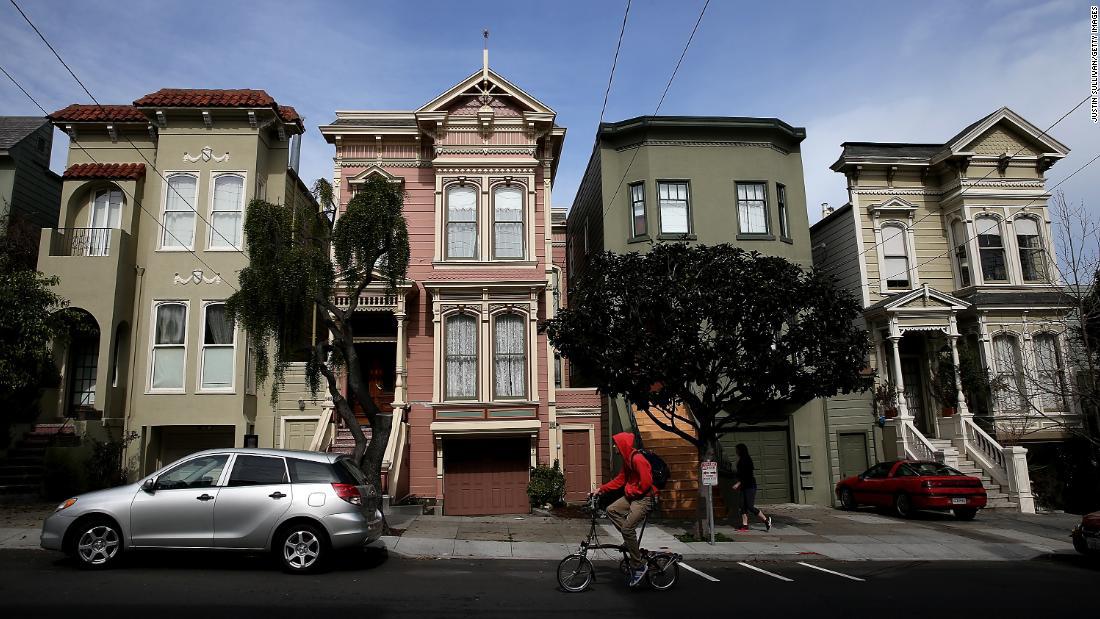"I want to buy a house, should I?"
3:35
(CNN Business) ––
Deciding whether to rent or buy a home can make you overthink and end up in incessant circles of financial doubt.
"Take advantage of low mortgage rates and build equity!" Says the part of your brain in favor of "buying."
"Be flexible and keep entry and exit costs low!" Says your "rent" rationale.
A lot of people moved from New York and California in 2020. This is where they went
Ultimately, the decision comes down to your financial capacity, how long you plan to live in the house, and what cash flow you have.
Although home purchases reached a 14-year high in 2020, prices also rose sharply.
Simultaneously, with so many people leaving major cities, landlords have been left reeling, and that has meant some attractive rental offers as well.
You should ask yourself these three questions to find out if renting or buying is what makes the most sense for you.
advertising
1. Do you have the financial capabilities?
Key to start deciding whether to buy or rent a house
The first step is to find out if buying is really an option for you.
The decision between renting or buying a home has less to do with house prices or rent and more to do with whether you are ready to own.
How will your savings be after making a down payment?
What is your credit score?
Andrew Dressel, a financial planner at Abundo Wealth in Minneapolis, prefers that people have six months of expenses saved in an emergency fund.
Also $ 10,000 in cash to cover closing costs and moving expenses, and a credit score of 720 or higher.
“Emergency savings are of great importance.
And the credit score of 720 has more leeway, "he explained.
Also, the total cost of owning a home should not exceed 40% of a person's take-home pay, he noted.
This includes your mortgage, utilities, taxes, appliance and yard maintenance, and everyday wear and tear.
"They also need to make sure that they are not sacrificing their retirement or other goals just to own a home right now," said Dressel.
Leo Marte, a certified financial planner with Abundant Advisors in Charlotte, North Carolina, said that people should also strive to be debt-free before buying a home.
"If you are not financially prepared, paying rent is essentially buying patience and insurance against the costs of owning a home," he said.
2. How long will you live there?
If you only plan to live in a certain place for two or three years, experts recommend renting.
Especially now.
"If you're in a city and you need to stay there, now is a great time to continue renting and get more for your money," explained Jay Abolofia, a certified financial planner at Lyon Financial.
"People can now rent in the city for much less because others have left the place and landlords have had to lower their rents," he said.
Buying a home in the US is a bidding competition 3:08
If you're feeling overwhelmed or in a rush to shop in some hectic markets with little inventory, he noted, renting isn't a bad option to get there.
If it's only for a year or so.
It also qualified the sense of urgency many potential buyers feel to lock mortgage rates at the all-time lows they are currently at.
As he explained, interest rates and home prices often have an inverse relationship.
"When interest rates are lower, that puts upward pressure on house prices," he said.
“Just because interest rates are low doesn't mean it's a good time to buy.
And higher interest rates do not mean it is a bad time to buy a home, "he added.
But, Abolofia noted, it's always a good time to shop if you plan to stay there for a while.
"The longer you stay, the more sense it makes to buy," he said.
Housing market, the undeniable bright spot of the US economy during the pandemic
Once you've determined the estimated time you'll be in the house, check in by asking yourself if you're being conservative enough about the space you can buy.
That was the recommendation of Leonard Steinberg, a Compass agent in New York.
"You have to be conservative enough to be able to eat and sleep soundly at night," Steinberg said.
"But many people are too conservative," he completed.
He related that he often sees people buying houses that are too small.
And, after a few years, they realize that space is not working for them, he said.
"Now they have the costs of selling and buying again," he said.
A situation that includes closing costs, inspections, appraisals and real estate commissions.
"Moving a lot is expensive," he said.
3. What are your monthly payments?
There is a certain amount of money that you will need to buy a house, complete the transaction, and maintain it.
So there is no point in rushing into a home before you can comfortably cover those costs.
"If you can pay the mortgage on a monthly basis, maintain an adequate emergency reserve and are at the right time in your life, go ahead and buy," said Noah Damsky, Chartered Financial Analyst at Marina Wealth Advisors in Los Angeles.
But, he cautioned, do the math first.
Damsky recommends that your monthly mortgage payment not exceed 35% of your gross income.
But that's the high end.
Other models are more conservative and suggest 25%.
This in order to keep the debt-to-income ratio lower.
An intermediate recommendation indicates that you should not allocate more than 28% of your monthly net income to pay the mortgage.
Also consider what you can pay in advance.
How do you know if the property price is exaggerated or not?
4:34
Buyers are traditionally encouraged to purchase a home with a 20% down payment, Damsky said.
However, it might be advantageous to accept a larger mortgage balance with a lower down payment, since mortgage rates are currently below 3%.
"I encourage clients with a down payment of less than 20% to buy a home if they can get mortgage insurance at less than 0.2% per annum and can maintain six months of emergency reserves after purchase," Damsky said.
While some potential buyers can expect the tax benefits of home ownership - including deduction of mortgage interest, property tax payments and other federal income tax expenses - Damsky cautioned not to overdo it. .
"I try to moderate your expectations by explaining that the tax benefits will often be substantially offset by an annual maintenance cost of about 1%."
And they must take this into account.
The out-of-pocket costs of maintaining a home could be even higher, said Matt Hylland, a financial planner at Arnold and Mote Wealth Management in Cedar Rapids, Iowa. He advises home buyers to budget for 2% to 3% of the value of housing to cover maintenance and upkeep.
"It's important to make sure you find a monthly payment that you can afford," Hylland said.
"But do not forget to add to those other expenses that you will face as an owner."
RentHousePurchaseMortgageHouse




/cloudfront-eu-central-1.images.arcpublishing.com/prisa/SCJWRKLWS5GWDHHWYUTVYTNNYM.JPG)

/cloudfront-eu-central-1.images.arcpublishing.com/prisa/2C5HI6YHNFHDLJSBNWHOIAS2AE.jpeg)



